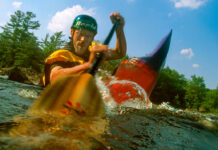Is the recent article in Car and Driver right in that, “Driverless cars are supposedly imminent”? Inside, thought leader Malcolm Gladwell suggests driverless cars, like smartphones, are going to have unexpected catastrophic consequences.
Engineers and programmers pushing mobile technology couldn’t have foreseen their pocket-sized supercomputers leading to a myriad of social ills, including higher rates of teenage depression and suicide. So where will driverless cars take us?
While kayaks and canoes were once the only modes of transportation long before the invention of the horseless carriage, recreational paddling as we know it has always involved the automobile. Virtually every paddling trip in living memory has involved four wheels, radio, heater, racks, and ropes.
Imagine your first paddling trip in a driverless car
Maybe you’d sit there and enjoy the scenery, but more likely after a few minutes, you’d be answering emails, making grocery lists or editing video. Making good use of the time, you might say. Except driving is already a good use of time.
Say we set out on a paddling trip together. I’m driving and can’t do anything else, so you politely keep me company. For the next two hours, we catch up because we haven’t seen each other since the fall. Gosh, hard to believe it’s been so long. We remember good runs and shitty boats we’ve had over the years. Plans are made for another trip later this month. Friendship is a good use of time.
Enter again the driverless car
Now neither of us needs to be paying attention to the road. We are free to do whatever. We’re on our phones more. We talk less. Ding! Sorry dude, just a sec. Ding! What were you saying about your sister?
Or perhaps we don’t carpool at all. We wouldn’t need to shuttle together because our driverless cars meet us at our final destinations. Thanks for finally solving the shuttle, Google.
Except your Google car hasn’t been upgraded to include the high-definition coordinates for forest access roads. Honda hasn’t coded a traction profile for deeply rutted muddy terrain. Tesla engineers didn’t think to include rooftop sensors for strap vibration so your boats shake lose. Or worse, the ultrasonic bumper sensors don’t register the poplar limb two feet too low to clear the boats above. And answer me this, how are we to thumb rides to put-ins from driverless cars?
Driverless car technology is being sold to us as a convenience
But canoeing, kayaking and standup paddleboarding is not convenient. It’s hot, cold, windy, buggy, off the beaten path, rainy, full of wood, too much swell, and generally more effort than a three-day war of Clash of Clans—how the real intended audience of driverless cars spends their long weekends. It is soulless technology companies ramming automotive automation forward.
.Driving, when you’ve done enough of it, allows for a high-level meditative state
With enough experience you’re able to manage the physical responsibilities of steering and maintaining constant speed at an unconscious level, freeing your mind to wander far from the yellow line. While trees and rocks zoom past at 60 miles per hour our brain waves slow way down.
The Theta state
When brain waves slow down to between four and eight cycles per second, is when we have stronger intuition, we have more capacity for wholeness, profound creativity and complicated problem solving. Basically, the slower our brain wavelengths and the more time between thoughts, the more opportunity there is for us to skilfully choose which thoughts to invest in and what actions we should take. While researchers measure brainwave frequency in hertz, I believe it can also be measured in miles.
Undisturbed by the usual day-to-day external stimulus of smartphones and crying babies, this state of mindfulness is responsible for creative things like this magazine, brave new boat designs, cockamamie expeditions, and very likely, Martin Litton’s plan to save the Grand Canyon or the secret formula for Gore-Tex.
The greatest unintentional consequence of driverless cars will affect the very inventors of them. Not to mention board shapers, adventurers, writers, photographers and athletes—virtually anyone wanting to sift through one idea after another in hopes of finding a creative solution to a problem. Like what should I write in this issue’s Off the Tongue.
Long live the analog road trip, paddling friends and the sacred time behind the wheel, where it’s still illegal in most regions to be on your device.
Scott MacGregor is the founder and publisher of Paddling Magazine. | No shuttle bunny, no problem | Featured Photo: Ryan Creary









Love your zine but the article, not so much. A good friend of mine has been known to rail against the idea of technology for technology’s sake. The opposite is also true: don’t reject new technology just because it’s technology. Being in some kind of zen state while you’re driving might be the cause of a lot of crashes. Driverless technology– if done right — could save a lot of lives.
I am utterly seduced by the idea that my driverless car could meet me at the take out. I mean, I hear everything you are saying, but if this is actually possible, then count me more irrationally enraptured than a MAGAt for orange koolaid.